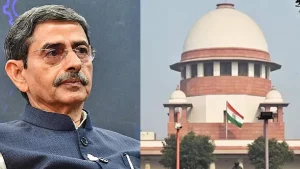Run At Cross Purposes

The Supreme Court judgement settling the dispute between Tamil Nadu Governor RN Ravi and the ruling DMK government over the clearing of Bills speaks volumes about the courage demonstrated by the apex Court. It has thwarted the Governor’s patently political intent of keeping Bills way beyond a ‘reasonable time’. The very next day, the SC issued the ruling fixing a maximum time limit of 90 days for the President of the Union to clear any and all Bills that are referred to the Rashtrapati Bhavan. This is yet another bold milestone that is rarely seen these days when the borderline between the executive and the judiciary often gets blurred to the peril of the institution of democracy that rests on the three pillars of the legislature, executive and judiciary functioning independent of one another.
The Bench of Justices JB Pardiwala and R Mahadevan, went even further and said in its judgement invoking Article 143 of the Constitution that the President “ought to” seek its (the SC’s) opinion where the Governor has reserved the Bill for her/his consideration on the ground of “perceived unconstitutionality.” Article 143 deals with the power of the President to seek the SC’s opinion on important questions of law or fact. Acknowledging that it is not mandatory for the government to accept its opinion, the SC added that the same “holds high persuasive value and should ordinarily be accepted by the legislature and the executive.” “Merely because” the jurisdiction under Article 143 is not binding, the Bench said, the principles used “by this Court to determine the constitutionality of the Bill” are not undermined.
Now, the question is what has propelled the apex court to act so firmly taking on not only the office of the Governor, but also the President, creating almost a constitutional crisis since it sets a precedent that the President may have to act in consultation with the SC for better understanding of constitutional matters such as expeditious disposal of Bills passed by a state legislature and then forwarded by a Governor to the President for the latter’s consent. These judgments came close on the heels of the discovery of a huge amount of burnt cash from the residence of Delhi HC Judge Yashwant Verma. The two may not be a coincidence. However, one may be within one’s rights to wonder whether the judges were trying to repair the loss of image of the judiciary. It also raises the disturbing question whether Justice Verma was alone in that game. For, his mere transfer to another High Court, instead of stringent and exemplary punishment being meted out to him, makes the action open to criticism. Doubt arises whether the matter was deliberately allowed to die a natural death since proper action against him might have resulted in the inconvenient opening of the ‘Judiciary Box’ or the proverbial Pandora’s Box.
It is being argued from some quarters that the apex court has exceeded its remit and sought to play the role of the executive in the garb of judicial wisdom. However, the SC said that in cases where a Bill has been reserved on the grounds that it is not in consonance with constitutional principles and involves questions of constitutional validity, the executive is supposed to exercise restraint. It is expected that the Union executive should not assume the role of the courts in determining the maintainability of a Bill and instead “as a matter of practice” should refer such a question to the Supreme Court under Article 143. The apex court even observed that it has “no qualms” in stating that the hands of the executive are tied when engaging with purely legal issues in a Bill. It held that only the constitutional courts have the prerogative to study and provide recommendations regarding the “constitutionality of a Bill.”
These are strong words indeed, but perhaps much needed in the present times when the executive has often been seen to be trying to get favourable court judgements. It is in the interest of a healthy Indian democracy that its three pillars – the legislature, executive and judiciary – run at cross purposes, rather than their interests converge.
News